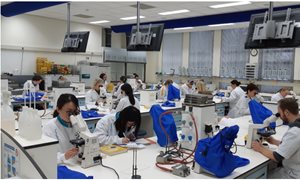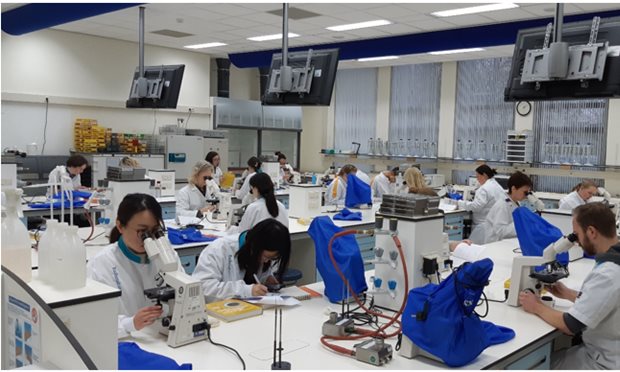

About the course
The Center of Expertise in Mycology of Radboud University Medical Center / Canisius Wilhelmina Hospital together with the Foundation Atlas of Clinical Fungi will organize a hands-on course on fungal identification. read moreAbout the course
The Center of Expertise in Mycology of Radboud University Medical Center / Canisius Wilhelmina Hospital together with the Foundation Atlas of Clinical Fungi will organize a hands-on course on fungal identification. This course is specially designed for lab technicians, but also other workers in lab diagnostics may wish to attend. Background of fungal classification will be explained in detail, with both theoretical and practical sessions. The relevant fungi will be shown, and brief introductions will be provided into other diagnostic techniques, such as PCR and Maldi-tof. A special session will be devoted to susceptibility testing. The course will be didactic in such a way that no special mycological background is required. The one-week course will terminate with an examination and certificate. Lectures will be given by Hein van der Lee, Sybren de Hoog and Paul Verweij.
In short
-
Course fee is 1000 €. As course materials, Larone’s “Guide to Medically Important Fungi” as an introduction, and the “Atlas of Clinical Fungi”, 4th edition, will be used. Participants are requested to bring their own laptop and lab coat.
-
Medical Microbiology, Radboudumc, Geert Grooteplein 10 Zuid, 6525 GA Nijmegen, The Netherlands.
Provisional program
Read the provisional program of this five-day course. read moreProvisional program
Day 1: Monday
Introduction to mycology
- Theory: Classification fungi, sporulation, determination fungi and used media, learn to work with Larone and the new Atlas of Clinical Fungi 4th edition.
- Practice: Phenotypic identification of fungi, microscopic and macroscopic.
Day 2: Tuesday
Dermatophytes
- Theory: Clinical appearance, taxonomy, problems of molecular identification, microscopy.
- Practice: Phenotypic identification of dermatophytes, microscopic and macroscopic.
ID of 5 unknown strains, self-learning.
Day 3: Wednesday
Yeasts and MIC testing
- Theory: Mycoses by yeasts, including Candida, Cryptococcus and Malassezia.
Antifungal susceptibility testing.
Alternative techniques:
Summary of molecular methods. Commercial kits, Dermagenius. MALDI-TOF. - Practice: Identification of yeasts and MIC determinations.
ID of 5 unknown strains, self-learning.
Demonstration of rapid methods, Lateral flow.
Day 4: Thursday
Opportunistic mycoses
- Theory: Aspergillosis, zygomycosis, Fusarium.
- Practice: Identification 25 opportunistic fungi.
Histology.
Day 5: Friday morning
Subcutaneous and endemic mycoses:
- Theory: Chromoblastomycosis, sporotrichosis, lobomycosis, rhinosporidiosis, blastomycosis, coccidioidomycosis, mycetoma, histoplasmosis.
Histology. - Practice: Demonstration of 10 rare opportunistic fungi.
Day 5: Friday afternoon
Final examination
